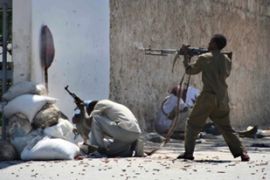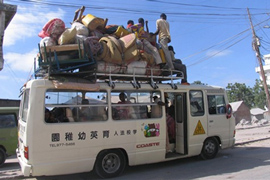Thousands flee Somalia fighting
Mogadishu exodus continues as Eritrea leaves IGAD over ‘irresponsible resolutions’.

Meanwhile, Eritrea‘s exit from the seven-member Inter-Governmental Authority on Development (IGAD) has been seen as a blow diplomatic efforts to unite foreign opinion on pacifying Somalia.
A statement on the Eritrean government website, shabait.com, said: “The Government of Eritrea was compelled to take the move due to the fact that a number of repeated and irresponsible resolutions that undermine regional peace and security have been adopted in the guise of IGAD.”
Ethiopia has accused Eritrea of sending arms and men to support the Islamist fighters, while Asmara says that Addis Ababa is occupying Somalia illegally at the behest of the United States.
| Your Views |
|
“The situation is Somalia has gone from bad to worse after the intervention of Ethiopian troops” Abed, Kumasi, Ghana |
A meeting of IGAD foreign ministers two weeks ago in Kenya became a forum for the catalysing feud between Ethiopia and Eritrea, bitter over their 1998-2000 border war and now locked in what many analysts see as a proxy war in Somalia.
Kenya, Uganda, Djibouti, Ethiopia, Sudan, Somalia and Eritrea are the countries who make up the east African bloc.
Mohammed Adow, Al Jazeera’s correspondent in Nairobi, said that Eritrea was not the driving force behind IGAD anyway, but the balance of power within IGAD may still shift further toward Ethiopia, who
“Countries in this region who come together in their regional bloc won’t like to hear this news.
“It will likely swing the balance now that Eritrea is not there to argue against Ethiopia having its way when it comes to Somali issues.
“However, Eritrea has not traditionally been the driving force when it comes to the issue of Somalia. Kenya, Uganda, and Ethiopia have been at the forefront, while Eritrea has been on the peripheries.”
Exodus
Hundreds of Somalis left Mogadishu on Sunday, bringing the total number of displaced people to more than 321,000 according to the UN – but locals have said that the number is closer to half a million.
“I think it’s nearer 500,000 now,” said the head of a Somali think-tank, who asked not to be named because of the precarious security situation.
“I have lost all hope,” one woman said, walking at the head of 11 relatives, mainly children.
 |
| Locals say the number of refugees leaving Mogadishu is near half a million [EPA] |
Adow, based in Nairobi, said: “Kenya‘s border with Somali remains closed. It has been since late December, when a huge exodus of people decided to cross the border, including remnants of the Islamic Courts Union.
“On the other side, at the Kenya Somali border, there are thousands of refugees who live in makeshift houses, who have nothing to depend on, and have not been allowed to enter Kenya.
“Organisations are trying to get food to them, but rainfall and poor roads are impeding their movement.
“Thousands of people are trying to get into Yemen via the Gulf of Aden by taking very precarious boat rides, and many of them are dying.
“In the last few weeks, many bodies have been swept ashore.”
In Mogadishu, bodies have been left to rot on the streets, some mutilated and decapitated by incessant shelling that has pounded residential neighbourhoods considered Islamist strongholds.
With Somalis keen to bury their dead quickly in accord with Muslim custom, some were digging makeshift graves by the road.
The Islamists ruled most of south of Somalia for the latter half of 2006, before being defeated by the interim government and its Ethiopian military backers in a war during the New Year.
Islamist fighters, however, backed by some disgruntled Hawiye clan elements and foreign fighters, have regrouped to rise up against President Abdullahi Yusuf’s administration and his Ethiopian backers whom they regard as foreign invaders.